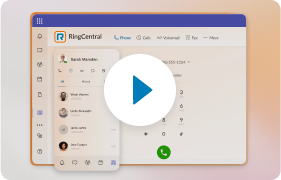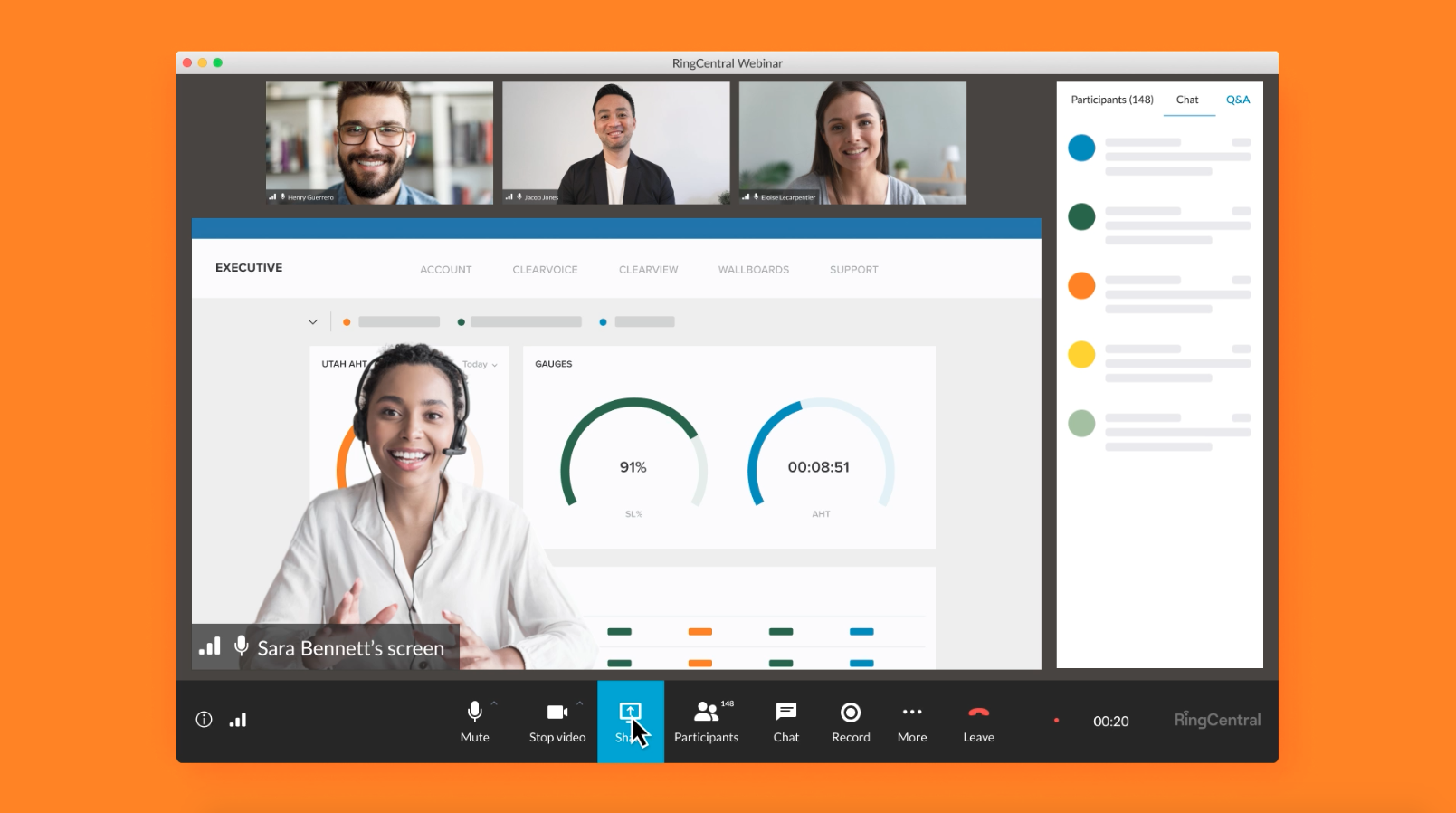Hopin is now RingCentral Events
Virtual events exploded in popularity in 2020.
It was a matter of necessity, of course. Due to lockdowns and social distancing, the internet became practically the only way for people to meet and gather.
What we discovered in the process, though, was that online events have real benefits. They can accommodate much larger audiences. They can include participants from across the globe. And they are cost-efficient and convenient.
That’s why—even after the pandemic—virtual events will remain a valuable tool for event organizers, marketers, internal comms teams, and others.
If you are planning to host your own online event, start by investing in a quality virtual event platform.
In this article, we’ll discuss what a virtual event platform is, its key features, how it differs from video conferencing and webinar tools, and what it allows you to accomplish. Let’s dive in.
What is the definition of a virtual event platform?
A virtual event platform is software that allows you to host interactive events—such as conferences, trade expos, and workshops—on the internet.
In the same way a venue like a hotel or conference center is the physical destination for an in-person event, the virtual event platform provides an online destination for a virtual or hybrid event.
In other words, it is where you host your event content and where your audience gathers to interact with that content and connect with other event participants. The event platform is where:
- Attendees buy tickets or register for your event
- Event managers host all event content, including where speakers present
- Sponsors and partners set up virtual booths
- Audience members consume and engage with the content
What are the key features of a virtual event platform?
While there are many video conferencing and collaboration tools, event platforms are a distinct solution, purpose-built to host events.
For example, business events entail large groups of people gathering to consume content, interact with experts and influencers, and network with other attendees.
Online event platforms accommodate that multifaceted nature of events. Some defining features of event platforms include:
Multiple virtual spaces
Perhaps the defining feature of a virtual event platform is its multiple virtual spaces or rooms, which allows you to host different types of content and encourage different kinds of audience engagement.
Think of a physical event venue. You might use a large ballroom for a keynote address and smaller conference rooms for breakout sessions.
Instead of a single virtual meeting room, an event platform gives you a number of differentiated virtual spaces—some better suited for presenting to a large audience, others for audience interaction, still others for private networking.
For example, the RingCentral Events virtual event platform includes:
- Stages: an area where you can broadcast to your entire event audience (e.g., for keynotes, opening ceremonies, entertainment)
- Sessions: an interactive area where moderators can invite multiple presenters and/or attendees on-screen (e.g., for breakout sessions, panel discussions, workshops, Q&A)
- Expo: dedicated exhibitor hall for sponsors, partners, sales teams, etc., to set up their own virtual booths
- Networking: private meeting rooms where attendees can meet 1-on-1
By including multiple virtual spaces, an event platform allows you to mimic the experience of an in-person event:
- Event producers can program concurrent sessions in different rooms
- Attendees can easily hop from one virtual room to another
- Participants have access to a variety of experiences—from watching a keynote, to asking questions in a group session, to browsing an expo hall, to connecting with another attendee 1-on-1
Tools for audience interaction
Audience participation is what makes an event, an event.
Beyond just hosting a live stream, a virtual event platform also provides a variety of engagement levers to enable and encourage event attendees to share ideas, make connections, and shape the conversation in real time.
Examples of these types of features include:
- Video Q&A: In RingCentral Events Sessions, for instance, moderators can bring multiple presenters and event attendees on-screen for a video exchange
- Video networking: Event attendees can meet and network with other attendees in small group sessions or via private, 1-on-1 video chat
- Direct messaging: Event attendees can find and connect with other attendees via the online platform and message them directly
- Polls and surveys: Event managers can solicit specific feedback from attendees before, during, and after the event
- Event and session chat: In RingCentral Events, attendees can share insights and questions (and emoji!) during sessions
Compared to other video communication and collaboration software, a virtual event platform is unique in the range of engagement opportunities it provides—all of which is designed to unlock a two-way conversation between speakers and audience.
Video
Video is core to an online event platform. The various virtual spaces within an event platform use video in different ways.
Take the RingCentral Events virtual event platform as an example:
- In Stages, event managers can live stream or broadcast pre-recorded video content to the entire event audience
- In Sessions, moderators can host dynamic, video conference-style conversations—bringing people on- and off-screen
- In Expo, partners or sponsors can play video content, showcase presentation slides, or engage in real time with attendees who visit their booths
- In Networking, attendees can participate in private, 1-on-1 video chat with other attendees
A key difference between an event platform and video conferencing or collaboration tools is the production value of the video content.
Because events are about brand promotion and audience engagement, a good virtual event platform provides the ability to elevate the quality of the video content.
RingCentral Events does this via StreamYard, a live video studio that you can use to broadcast professional, branded live video content on your event stages. StreamYard allows you to mix live and pre-recorded content, add on-screen graphics like name cards or CTAs, switch between layouts, etc.
Branding options
Another key feature of an online event platform is the ability to customize branding.
Think of an in-person event. You would never host an event in a totally bare hotel or conference space. Instead, you would decorate the space, set up activations, etc., to create an engaging, branded experience for your attendees.
The same goes for an online event. As your online venue, a good event platform gives you the ability to customize your virtual venue—to use your brand logo, imagery, colors, etc.—so that your online experience feels unique and of a piece with your other brand initiatives.
This is another distinguishing factor of an event platform, compared to video conferencing and collaboration tools.
Because the latter are designed for utility and efficiency—rather than for crafting a branded experience for a large audience—they offer minimal (if any) opportunities to customize the user interface.
Why do you need a virtual event platform?
Simply, if you want to host an online event, an event platform is the right tool for the job. Online event platforms are purpose-built for events and their specific requirements:
- Scale: Whereas video conferencing or collaboration tools are designed for 1-to-1 or 1-to-few communications (like small group meetings or working sessions), event platforms are built for 1-to-many broadcasts.Event platforms can accommodate many users at once. For instance, RingCentral Events can support up to 100,000 concurrent attendees.As a rule of thumb, if you are hosting an event for more than 25 people, consider using a virtual event platform.
- Simultaneous content: Very often, events have multiple tracks of content running at the same time.Because event platforms offer multiple virtual spaces within the context of a single, overarching online environment, they allow for more complex programming, including concurrent content.In other words, attendees don’t have to click a new link to join a separate video conference. Rather, they can hop from one virtual room to another, without leaving the larger event environment.
- Networking: Events involve content that attendees consume and engage with—but they also entail attendees meeting each other and making connections.A virtual event platform allows for this unique circumstance—providing space to host content for a vast audience, while also allowing for attendees to meet and connect privately within the context of the larger event.For example, the RingCentral Events provides dedicated virtual rooms—within the event—for 1-on-1 video networking.
- Control and customization: Events aren’t impromptu. In the same way you plan content for your in-person event, you want to have control over your online event content, which may go out to thousands or tens of thousands of attendees.Virtual event platforms allow you to curate and craft your online venue, program, virtual spaces, and the content itself in a way that video conferencing tools do not easily allow.
What is the difference between a virtual event platform, video conferencing software, and a webinar tool?
There are many video-based technology solutions that enable people to communicate, collaborate, and connect remotely.
Consider event platforms, video conferencing software, and webinar tools. Each of these solutions was created for a specific purpose and has an ideal use case:
- Virtual event platform: Ideal to host events that emulate in-person gatherings. With an online event platform, event managers can sell tickets, plan multiple sessions in different breakout rooms, facilitate virtual networking, etc. Most solutions in this category can accommodate thousands of people at one time.
- Video conferencing software: Ideal to host small, private get-togethers like meetings. Because of this, most video conferencing software doesn’t include the audience engagement tools that virtual event platforms do.For example, not every tool in this category has breakout rooms, audience surveys, or networking features. You also don’t have the same branding options that you get with an event platform.
- Webinar tool: Ideal to host individual presentations for small to midsize groups. Think of webinar tools as the halfway point between video conferencing software and virtual event platforms.With a webinar solution, you can host short, public presentations that build authority, generate leads, and boost sales. However, webinar software doesn’t allow for full-fledged virtual events because it doesn’t have as many audience engagement tools and generally can’t host as many people at one time.
Compared to video conferencing software and webinar tools, virtual event platforms are relatively new. As a result, many organizations may have access to or familiarity with the former, but not the latter.
When hosting virtual events, people often try to extend the use of video conferencing software or webinar tools. But in doing so, they put themselves at a disadvantage because these tools weren’t designed to host large-scale events.
What can you do with a virtual event platform?
With an event platform, you can host engaging online gatherings that emulate live in-person ones.
This means that a quality virtual event platform will enable you to host keynote speakers, sell tickets, deliver content, analyze attendance statistics, and otherwise manage your entire gathering from start to finish—all from a convenient digital dashboard.
Here’s what else you can do with an online event platform:
Host multiple kinds of content
As discussed above, one the primary advantages of a virtual event platform is that you have access to more than one virtual room. This means you can host multiple sessions, workshops, etc., simultaneously.
For example, using an event platform like RingCentral Events, you can start your virtual event with a keynote for all attendees. Once your speaker is finished, you can give your audience a choice to attend Session A, Workshop B, or a 1-on-1 video networking meeting.
The ability to split your virtual conferences up like this allows you to host more interesting events and better engage attendees because they can choose the content they consume.
Facilitate networking
People attend industry events for a variety of reasons: to learn from recognized experts, break up their normal, day-to-day routines, promote their companies, etc.
But they also attend to network with other professionals in their field and develop their careers. This is an important point. Your events will be much less rewarding to attendees if they don’t have the ability to meet and engage with each other.
Fortunately, the best virtual event platforms give attendees creative ways to network with their peers via private video sessions that take place within the larger context of the event.
Engage attendees
It doesn’t matter what kind of event you plan to host—in-person, virtual, or hybrid—audience engagement should be at the top of your priority list.
Why? Because engaged attendees are satisfied attendees, and satisfied attendees are more likely to join your future events, post positive reviews of them on social media, and encourage their friends and colleagues to attend as well.
Engaging attendees is hard, especially in virtual settings. However, online event platforms make audience engagement easier with features like:
- Video Q&A
- Video networking
- Breakout rooms
- Collaborative whiteboarding
- Audience polls and surveys
- Public and private chat
- Interactive games
Learn about your audience
Modern business runs on data. The more of it you have, the better decisions you can make.
This is one area where virtual events clearly outpace in-person ones. With the right virtual event platform, you have access to user analytics, so you can see which sessions your attendees watched, how long they watched for, whether they participated in the sessions, and more.
You can then use this information to optimize future events, identifying messaging and content that resonates with your target audience, and even use it to inform broader marketing or business decisions.
Customize your event
Many virtual event platforms allow hosts to customize their get-togethers by adding brand logos and imagery, updating fonts, using custom colors, and more.
By customizing the look of your virtual event, you help distinguish it—and, by extension, your company—from other events in your industry and competing brands.
Build your business
An event platform also helps you better connect with your target audience, learn more about them, generate leads, and sell more products.
By hosting quality virtual events, your company can become an authority in its niche and build trust with its ideal customers. As mentioned above, you’ll also learn more about those customers via the analytics dashboard in the event platform.
Both of these things will allow you to move prospects through the buyer’s journey in a more efficient manner.
Conclusion: An event platform helps you realize the advantages of virtual events
An event platform is the foundation of a successful virtual event.
With this kind of software, you can create online events that emulate the experience of an in-person event—while also bringing in and engaging a larger, more geographically diverse audience.
Virtual events have unique advantages—reach, participation, ROI and cost-efficiency, audience insights, etc. By using an event platform—a solution purpose-built to host multifaceted events—event organizers can realize the full potential of online events.
Updated Mar 13, 2025












